The rebranded Bianca Green has survived fashion industry fame, years of cannabis advocacy and brand building, a trademark battle, and Stage 2 colorectal cancer. Now, she’s ready to build on her successes and lead cannabis brands to practice social responsibility.
Most people still know her as Bianca Barnhill—the “Anna Wintour of Weed.” Returning to her roots (Green is her birth name), the agile and peripatetic activist, collaborator, and entrepreneur, whose ability to bring disparate people together to achieve positive change is unparalleled, will be known as Bianca E. Green of B.E. Green Media, the House of Green, and Spark the Conversation.
Whatever her name, Green is a special sort of human. In a world full of media and marketing specialists whose job is to make the mundane appear sublime, Green stands out as a connector supreme, a muse to many, a visionary of the possible, and a driven individual whose good heart acts as a beacon guiding her through the rocky terrain of life. One could also say she has lived several lifetimes already, always building on either the successes or failures of the past to reinvent a new, better version of herself. Always reassessing, always seeking to grow, at this poignant moment in her journey, she has rededicated herself to the plant and the people who bring its healing powers to the world.
Whether or not she is aware of it—and certainly, she is—when Green speaks, every fiber of her being is geared toward marketing and the issues and subjects she believes are essential components of effective and successful branding. The skill is in her DNA, an essential and defining component of who she is. How did she become this way? The simplest answer is that she is a creature of her upbringing and the many influences and influencers that have touched her life since she was a little girl growing up in what at one point was a fairytale existence.
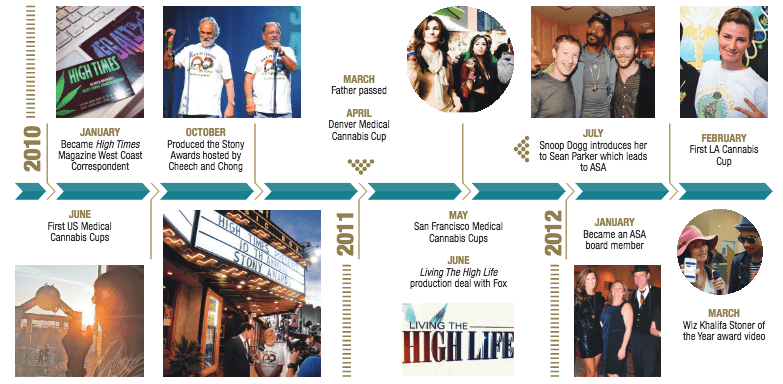 Foundation
Foundation
Born into an accomplished family in 1975, Green lived a privileged existence that included horseback riding and summers in the Hamptons. Her parents were high achievers—her mom a successful interior designer and her dad a former Naval aviator and engineer whose cousin was a governor of Missouri. The idyllic existence was not to last. By the time she turned 13, the insanity of the drug war had invaded the sanctity of her family, ripping it apart and leading to divorce. At a tender age, Green began facing the realities of life, and was exposed to very different ideologies about the impact of drug use on people and society.
On the one hand, there was her extremely conservative, anti-drug rock parents, and on the other, her uncle and godfather, one of the nation’s leading criminal defense attorneys, famous for his work defending people like John Gotti Sr., Huey P. Newton, and Timothy Leary, among many, many others. He also represented High Times magazine from its founding, and eventually became an owner of the storied publication and a staunch advocate for the legalization of cannabis. Her father died in 2011 and her uncle passed earlier this year, but the influence of the two men still lives inside Green and helps guide her outlook on life.
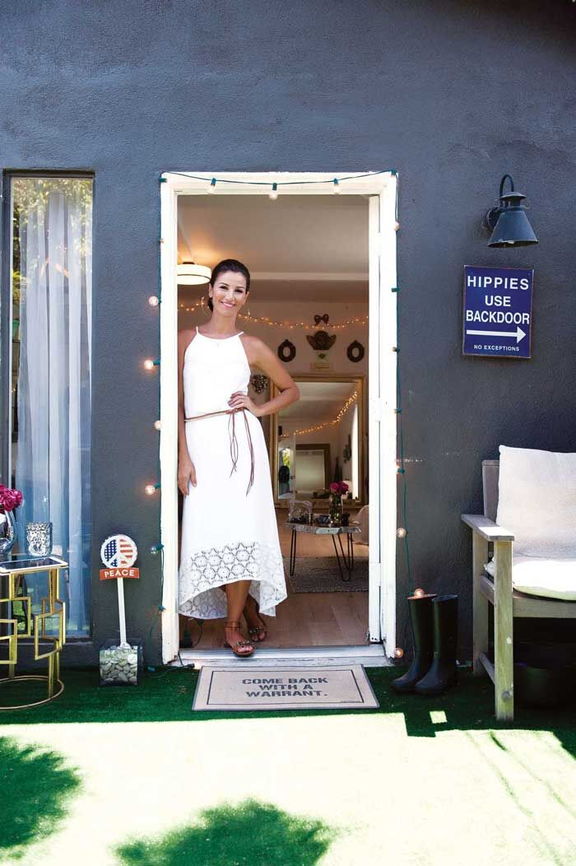 Green was modeling professionally by the time she was in high school, and the fashion world beckoned seriously before she headed to college to study child psychology and “help kids before they turned to drugs.” But only a few semesters into her academic career, the lure of the fast life took hold and Green accepted a recruitment offer in New York City. She eventually became one of the fashion industry’s top models, traveling the world as a brand ambassador for Ralph Lauren and Giorgio Armani.
Green was modeling professionally by the time she was in high school, and the fashion world beckoned seriously before she headed to college to study child psychology and “help kids before they turned to drugs.” But only a few semesters into her academic career, the lure of the fast life took hold and Green accepted a recruitment offer in New York City. She eventually became one of the fashion industry’s top models, traveling the world as a brand ambassador for Ralph Lauren and Giorgio Armani.
“My friends and colleagues were people like Donatella Versace, Tom Ford, and Rachel Zoe, all of whom ran fashion houses with billion-dollar brands,” she recalled. “I was very lucky to be in a position to watch historic empires being built and rebranded through events, brand ambassadors, and the media outlets that supported their visions.” Her learning curve was straight up, and at times her advice was sought by these masters of the fashion world.
At the same time, she was creating relationships with master branders like Russell Simmons, Seann Combs, and Jay-Z, who were creating a revolution in the way commercial empires were built. In many ways, she says now, they were giving birth to a vibrant counterculture and finding innovative new ways to meld media and message to create brand awareness and loyal followings. She began advising them, and started a business called The Conduit Queen, which connected celebrities’ causes and brands.
One of her closest friends was Bennie Medina, who managed JLo and Puff Daddy. Her immersion in the world of big brands and big names served as a master’s degree in marketing. In an effort to change the way society viewed the counter culture, she encouraged collaboration over competition as she helped her entrepreneur friends move boldly into the mainstream.
During the same period she married a supermodel whose career was every bit as epic as her own. But once again, the dark cloud of hard drugs entered her life: Her husband succumbed to an addiction to crack and heroin. “My journey became dark,” she said. It led her down a path of self-destruction that included poor eating habits, depression, too much alcohol, and anxiety medication to help her deal with the fear her husband might die. “I think I may have even made myself sick.”
 Cancer
Cancer
At the tender age of 29, Green found herself facing another challenge. A diagnosis of Stage 2 colorectal cancer. Luckily, it was discovered early, but the resulting chemotherapy shook her world to the core. “It left my body lifeless,” she said. “The chemicals really messed with my well-being.” Two years after finishing chemo, she was taking thirteen pharmaceuticals to deal with the symptoms and side-effects. In the meantime, her modeling career had come to a crashing halt. The way forward appeared uncertain.
Then, one day everything changed.
“A girlfriend from my modeling days told me I looked like I was dying,” she recalled, “and she suggested I try cannabis to help. She was the mother of four and a daily smoker.” Green’s uncle’s work as a cannabis activist also took hold of a part of her, and for the first time, she began to embrace the plant as an agent for wellness and healing. Within six weeks, she was off all the meds. Her life would never be the same. Years later, she noted, “I realized what Bob Marley meant when he said ‘herb is the healing of the nation.’”
 Embracing the plant
Embracing the plant
Thus began the next chapter in Green’s life. In 2009, back in California, and estranged from her husband but filled with new purpose and optimism, she began working for High Times as its West Coast correspondent. The trajectory of her life may have shifted, but everything she had learned in New York and elsewhere still percolated within her. Never able to sit still for long, with energy and ambition to spare—and most certainly with a new lease on life thanks to the miraculous healing powers of the plant—Green set out on a new mission: to change the social stigma of cannabis and the people who use it. A homegrown marketing activist was born.
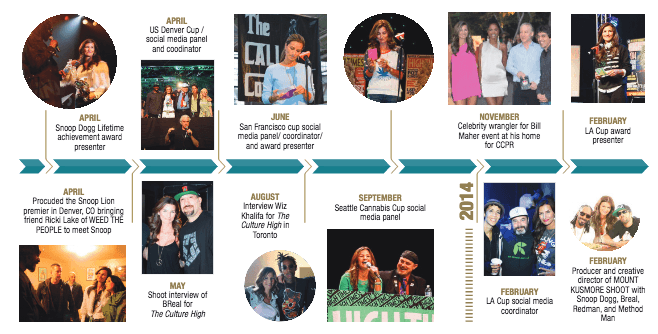 The Cup and living the high life
The Cup and living the high life
At her first High Times Cannabis Cup when it debuted in the United States in 2010, Green met medical cannabis patients for the first time, and was moved by their stories and started interviewing them. Working on fifteen Cups over the years in a variety of capacities, she utilized her impressive social media chops to brand the events to the masses and began implementing a grand strategy to bring her many music and movie friends into the fold in order to make a massive impression on the culture.
But as far along as the industry was—or thought it was—at this point, getting the biggest celebrities to embrace true activism remained a struggle. Close friends with Snoop Dogg, Green found herself explaining to him how the scheduling of drugs by the DEA works. She also talked about the importance of reform, and the ways in which messaging and marketing can be used to create mega-brands while simultaneously improving the planet.
“This is all I have preached for years,” she said. “I would sit and talk for hours about the importance and opportunities in cannabis media, trying my best to drive the point home.”
She became a formidable brand ambassador for the plant, meeting everybody who was anybody in the movement and the industry and figuring out where she fit in the scheme of things. She joined Americans for Safe Access as a board member (she still serves in the position) and became tight with its founder, Steph Sherer (also profiled in this issue). By the end of 2012, ASA was suing the DEA to reschedule cannabis.
In 2012, Green signed on as executive producer for the documentary The Culture High. Released in 2014, the film, available now on Netflix, was well-received upon release and is seen as a significant milestone in the anti-drug war movement. Once again, Green was using her conduit skills to bring heavy hitters like Snoop and Wiz Khalifa into the production.
She also produced the “epic and historic” Mount Kushmore series and the Fox docu-series Living the High Life, all the while dealing with some big personal challenges. “I had 11 surgeries between 2011 and 2015,” she pointed out. In spite of everything, she religiously showed up in Washington, D.C., to lobby and volunteered her time at the Cups. “I was so busy working for the plant I neglected my own well-being, and one day I woke up and was homeless,” she said, adding, “The farmers saved my life.” Feeling lost, she took some time to get back in touch with what her purpose was and began to clarify what she needed to do, how she wanted to do it, and who she wanted to do it for. The phoenix finally was rising.
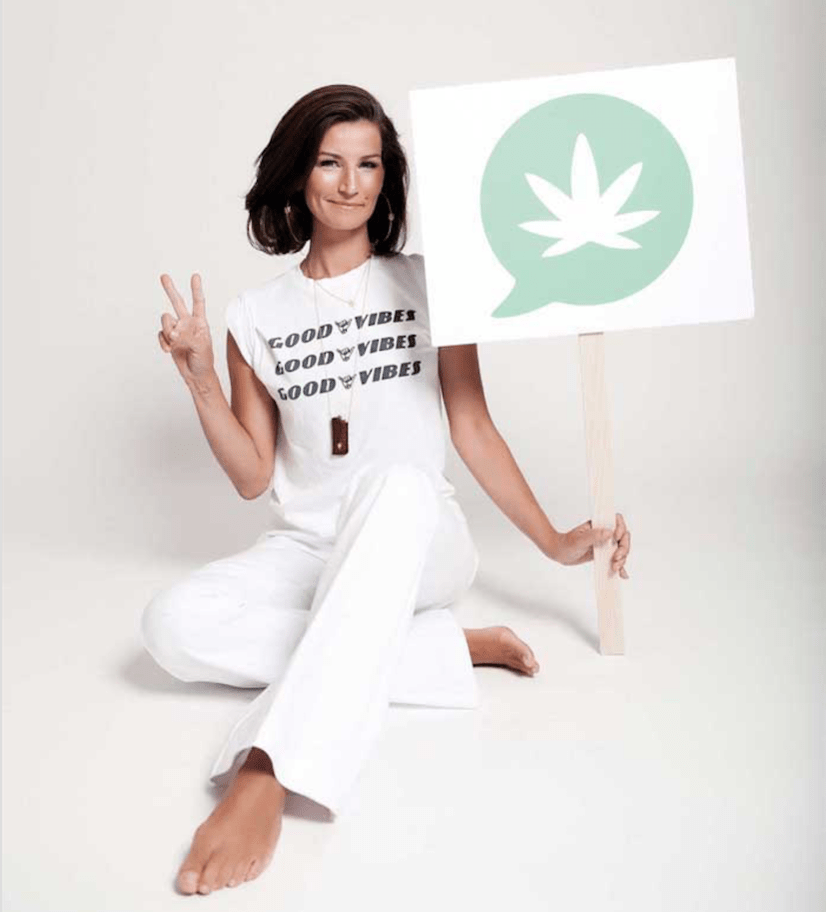
The activist life
There is no daylight between Bianca the messenger and marketer and Bianca the activist. After all her trials and tribulations—dealing with lingering health issues, a trademark battle she finally settled, and the loss of cherished family members—she is taking everything she has learned and putting it into a more organized and commercial form. What is truly notable about her story, however, is the inimitable nature of her life. There simply is no one else with her history, experience, and connections or the sense of how all the pieces fit together to make something greater than the sum of the parts.
Particular about who she represents, Green in unapologetic about expecting certain non-negotiable things from her clients. She expects them to listen to her, to step up as advocates for the industry and community, and to put their money where their mouth is. In return, she promises fame, success, and riches, along with the priceless knowledge that their efforts are making the world a better place.
“Yes, there are the things I look for in clients, but those are also the things I respect in them,” she said. “Because they are willing to do whatever it takes to heal people in the same way I was willing to do whatever it took to mainstream marijuana so we could see change.
“Getting rich isn’t important to me,” she added. “Making impact and saving people who deserve a shot because they’ve been doing things to try to keep this movement alive is where my head is. If there are like-minded people out there who are eager to heal people, I am more interested in that from a client perspective than someone who is just in it for the money.”
Her message remains the same. “What I want people to know about me is my dedication to social responsibility. The war is not over. We are an industry existing on the things that people like me—who are full-time, non-profit activists—have given to it. If the industry wants to succeed, then it has to become a community that creates social responsibility, so that we have a shot against the big boys. That is my secret sauce and my mission. Whatever you do, social responsibility has to be a part of your business.”
She is equally adamant about sending the same message to her friends. “We’ve skipped a step,” she said. “I’ve been calling every celebrity that ever did an interview for me—many of whom now own their own cannabis businesses—and telling them the drug war is not over. It’s the message we all need to speak to before becoming completely celebratory.”
 Sparking the conversation
Sparking the conversation
Green founded her non-profit, Spark the Conversation, to do on a large scale what she does on a daily basis. With a mission to be “the cohesive voice for the cannabis movement,” Green uses Katie Couric’s Stand Up to Cancer charity program as the inspiration and model for Spark.
“It is a pretty massive fundraising platform. Katie utilizes all of her celebrity friends once or twice a year, raising about $100 million,” Green explained. “The goal of Spark is to do the same thing for the cannabis community. Bring in tastemaker celebrities and brands, along with the community, to raise money via social media campaigns and fundraising-slash-educational events. “
To that end, Spark is putting together initiative for the Fall, including the “High, My name is…” social media campaign, and a bus tour throughout California scheduled to start sometime in October. The two-week-long tour will start in Eureka and run the length of the state down to the border—with multiple stops along the way mostly at dispensaries and colleges—ending in Oakland on election day. Supported by Green’s clients and others, sponsorship opportunities are still available for companies interested in educating both consumers and members of the industry.
The tour is just the beginning of a much larger plan. “In 2017, we’d like to do a lot of different events that are celebrity-driven with our influencers and brand ambassadors,” she said.
 The message is the message
The message is the message
Green’s life is settling down, enabling her to put her plans into play. After an impactful year of change, and focused on her own and others’ wellness, she is harvesting the seeds she planted long ago. She is constructing (and curating) a house of clients that includes companies like grower Humboldt’s Finest and accessory designer Jacquie Aiche. She also intends to spend time in Northern California, close to clients but never far from the action. No matter what the future brings, her way forward is clear; her purpose consistent.
“I carry a purse with a huge pot leaf on it,” Green said of her philosophy. “I wear my message everywhere I go. That’s what life is about right now: telling your story and creating messages that resonate with the consumer so you have a likeminded business model. If you are putting out positivity, you’re going to raise up consumers who are positive and come together to implement even more positive change. So it is a net positive overall. That’s why it’s called Spark the Conversation and not Host the Conversation. We’re not going to tell you what’s right, but help create a community thought process. Our slogan at Spark is, ‘It’s a joint effort.’
“This is the only social movement with a billion-dollar industry attached to it,” she added. “There is enough room and money in it for everybody, but we have to be mindful that the plant comes first. The more people who have access to it, the closer we are to healing. After all, the only difference between illness and wellness is an ‘I’ and a ‘we.'”
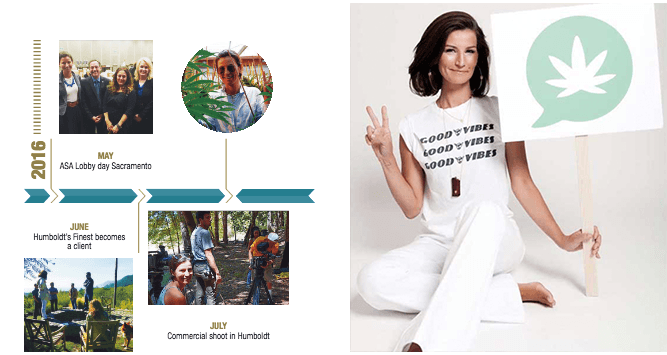
For more information, visit thehouseofgreen.com and sparktheconversation.org.








